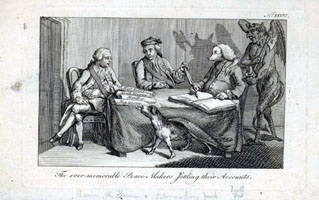The Treaty of Paris

The Treaty of Paris—signed by Great Britain, France, and Spain in February 1763—ended the Seven Years War but did so in a way that turned the British government upside down. The terms of the peace, crafted mainly by John Stuart, Earl of Bute, seemed reasonable enough on their face, even propitious, especially for a government that was especially anxious to see an end to the fighting. From France, Britain gained Canada and everything claimed by France east of the Mississippi; the Caribbean islands of Grenada, St. Vincent, Dominica, and Tobago; and all French forts in India (France kept Guadeloupe, Martinique, St. Lucia, and its trading stations in India). From Spain, Britain obtained West Florida, Senegal, and Minorca. The political cost was high, though. William Pitt resigned as Secretary of State for the Southern Department in 1761 when it became clear that the rest of the Cabinet neither shared his commitment to particular peace terms, such as excluding the French from the lucrative cod fisheries of the North Atlantic (access to which France retained in the final treaty), nor his zeal for a pre-emptive attack on Spain.
Pitt's departure paved the way for Bute's elevation to First Minister and led to a bitter fight on the floor of the House of Commons between Pitt's supporters and the government over the treaty's terms (although they eventually passed, in December 1762, with substantial majorities in both chambers of Parliament). The broader political fallout, however, was much more serious. Bute's popularity sank to unprecedented depths in the English political nation, especially after his introduction of a tax on cider in March 1763 that included a power for tax officials to enter private buildings without warrant, which fueled existing suspicion on both sides of the Atlantic that he was singlehandedly responsible for corrupting both the King and the British constitution. Bute was verbally and physically abused wherever he went and his symbol-a jackboot-was regularly burned as in effigy.
John Wilkes, in particular, a member of Parliament and political polemicist, made a name for himself by attacking Bute in a new weekly publication created specifically for the purpose: The North Briton, the title of which played on the connection between Bute and a growing mistrust of all Scots as malevolent schemers, was launched in June 1762. The main targets of the North Briton were Bute and the peace terms, which, according to the paper, "saved England from the certain ruin of success." Wilkes' journalistic assault on Bute was increasingly vociferous and personal until he reached a tipping point on April 23, 1763, with North Briton No. 45. Bute had bowed to popular resentment and resigned from office on April 8, but his successor, George Grenville, included praise for Bute's peace treaty in the King's speech to close the parliamentary session. Wilkes wasted no time in denouncing it as "ministerial effrontery" to attach George III's name to such an "odious" measure as the Treaty of Paris. Grenville reacted by issuing a general warrant for the arrest of the authors, printers, and publishers of North Briton No. 45 under a charge of seditious libel. No specific names were mentioned, however. The ensuing legal battle in which general warrants were declared unconstitutional by the courts transformed Wilkes into a powerful transatlantic symbol of constitutional liberty.










